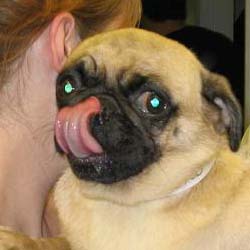
![[Welcome to the Ohio Pug Rescue, Inc.]](https://www.ohiopugrescue.com/images/logo2.gif)
Get Facts on Puppy Mills
Puppy mills are breeding facilities that produce purebred puppies in large numbers. The puppies are sold either directly to the public via the Internet, newspaper ads, at the mill itself, or are sold to brokers and pet shops across the country. Puppy mills have long concerned The Humane Society of the United States.

The documented problems of puppy mills include overbreeding, inbreeding, minimal veterinary care, poor quality of food and shelter, lack of socialization with humans, overcrowded cages, and the killing of unwanted animals. To the unwitting consumer, this situation frequently means buying a puppy facing an array of immediate veterinary problems or harboring genetically borne diseases that do not appear until years later. In 1994, Time magazine estimated that as many as 25% of purebred dogs were afflicted with serious genetic problems.
Sadly, some dogs are forced to live in puppy mills for their entire lives. They are kept there for one reason only: to produce more puppies. Repeatedly bred, many of these "brood bitches" are killed once their reproductive capacity wanes.
Thousands of these breeding operations currently exist in the United States, many of them despite repeated violations of the federal Animal Welfare Act (AWA). The United States Department of Agriculture (USDA) is charged with enforcing the AWA; however, with 96 inspectors nationwide who oversee not only the thousands of puppy mills, but also zoos, circuses, laboratories, and animals transported via commercial airlines, they are an agency stretched thin.
The HSUS, along with other animal-protection groups, has successfully lobbied for increased funding for AWA enforcement. Although all 50 states have anti-cruelty laws that should prevent neglect and mistreatment of dogs in puppy mills, such laws are seldom enforced.
The HSUS strongly opposes the sale, through pet shops and similar outlets, of puppies and dogs from mass-breeding establishments. Puppy-mill dogs are the "inventory" of these retail operations. Statistics from the Pet Industry Joint Advisory Council (PIJAC) indicate that approximately 3,500 to 3,700 of the 11,500 to 12,000 U.S. pet stores sell cats and dogs. PIJAC also estimates that pet stores sell 300,000 to 400,000 puppies every year. The HSUS estimates the number to be 500,000.

Purebreed registration papers only state the recorded lineage of a dog. Accuracy of the reported lineage cannot be guaranteed. The American Kennel Club (AKC), the most widely recognized purebred dog registry, readily notes that it "is not itself involved in the sale of dogs and cannot therefore guarantee the health and quality of dogs in its registry." Clearly, it is "buyer beware."
The "Retail Pet Store" Exemption Problem
The USDA has never required dealers who sell their animals directly to the public to apply for licenses, regardless of the size of the operation. The Animal Welfare Act (AWA) excludes "retail pet stores" from its minimum humane care and handling requirements, and it is the USDA's position that these dealers are retail pet stores. However, many think that a person breeding animals on his own premises and selling them directly to consumers is not a "retail pet store."
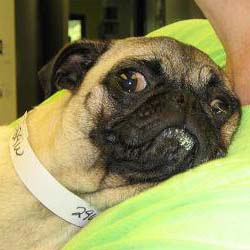
Each year American consumers purchase dogs from unregulated dealers who sell animals from their premises. Many of the animals are sold through newspaper advertisements and via the Internet, which means the purchaser can't see the conditions in which the dogs live. A number of investigative reports, however, have revealed that these facilities can be horrific. Thirty-five years ago, Congress passed the AWA to, in part, ensure that breeders provide humane treatment to animals in their care. AWA requirements include adequate housing, ample food and water, reasonable handling, basic disease prevention, decent sanitation, and sufficient ventilation.
On May 11, 2000, a coalition of animal protection organizations and individuals filed a lawsuit charging the USDA with failing to halt cruel and inhumane practices at breeding facilities. The plaintiffs outlined the USDA's illegal actions in exempting pet dealers who were not retail stores from compliance with the humane treatment standards mandated by the AWA. The complaint also described how the USDA's lack of appropriate application of the AWA can lead to the injury, illness, and death of untold numbers of animals.
On July 31, 2001, the U.S. District Court for the District of Columbia ruled that the language and history of the AWA clearly show that an individual who sells dogs and cats from his or her own premises is not a "retail pet store." Thus, the court found that USDA's exclusion of all commercial dealers who sell dogs and cats directly to the public is in violation of Congress' express intent under the AWA.
Upon appeal by the USDA, the decision was overturned. This strikes a huge blow against the effort to protect all dogs in large scale breeding facilities. Because of USDA's appeal, dogs who are used in such breeding operations, and whose puppies are sold directly to the public, have no protection under the Animal Welfare Act. Animal protection groups have petitioned the Supreme Court to request the case be heard.
The HSUS has been fighting a relentless battle against puppy mills since the early 1980s, including monitoring the USDA's performance in this area and pushing for better AWA enforcement.

In 1984, the General Accounting Office, the investigative agency of the U.S. Congress, found major deficiencies in the enforcement of the AWA regulations concerning puppy mills. Despite improvements in its inspection process, the USDA lacks the resources to effectively enforce these regulations.
In 1990, frustrated by the apathy of federal and state officials, The HSUS led a nationwide boycott of puppies from the seven worst puppy mill states: Arkansas, Iowa, Kansas, Missouri, Nebraska, Oklahoma, and Pennsylvania. The boycott captured a great deal of national media attention, including numerous newspaper articles and television reports on shows such as 20/20, Good Morning, America, and The Today Show.
Raids on puppy mills subsequently took place in Kansas, where the state legislature, attempting to protect recalcitrant puppy mill operators by hampering investigators, enacted a law making it a felony to photograph a puppy mill facility.
As the horror of puppy mills gained attention, some states responded with "lemon laws" to protect consumers who buy puppies. As of August 2001, 17 states had enacted laws or issued regulations that allow consumers to receive refunds or the reimbursement of veterinary bills when a sick puppy is purchased. While these laws place a limited onus on pet stores and puppy mills to sell healthy puppies, and theoretically improve conditions at the breeding facilities, The HSUS feels that they do not adequately protect the animals who suffer in these establishments.
Latest Developments and HSUS Action
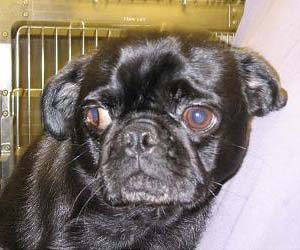
Facing an unreliable regulatory environment and legislatures unwilling to pass statutes that directly combat the problem of mass breeders and their nationwide network of dealers, The HSUS continues to target the consumer for its anti-puppy-mill messages. Consumer demand for purebred puppies, more than any other factor, perpetuates the misery of puppy mills.
Unfortunately, a dog's lifespan is often longer than a consumer's desire to maintain this "product." As a result, millions of dogs are sent to animal shelters every year, where roughly half will be euthanized. The HSUS estimates that one in four of the dogs that enter U.S. animal shelters is purebred.
To close down puppy mills and ensure the safety and humane treatment of dogs trapped in commercial kennels, you can:
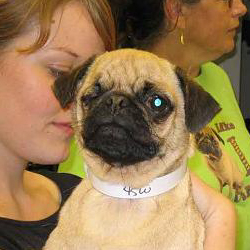
There are many definitions of what a puppy mill is considered to be. I think the most accurate one is when the breeder(s) is not acting in the best interest of the dogs or the breed. Here are some definitions of the different types of breeders and what they do. Pet stores often say they do not buy from puppy mills but they do buy from brokers or commercial breeders. The brokers are basically the middleman between the commercial and backyard breeders and puppy mills and the pet stores.
Hobby breeder: A breed fancier who usually has only one breed but may have two; follows a breeding plan in efforts to preserve and protect the breed; produces from none to five litters per year; breeds only when a litter will enhance the breed and the breeding program; raises the puppies with plenty of environmental and human contact; has a contract that protects breeder, dog, and buyer; runs a small, clean kennel; screens breed stock to eliminate hereditary defects from the breed; works with a breed club or kennel club to promote and protect the breed; and cares that each and every puppy is placed in the best home possible.
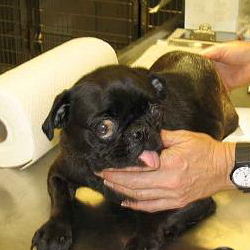
Commercial breeder: One who usually has several breeds of dogs with profit as the primary motive for existence. The dogs may be healthy or not and the kennel may be clean or not. The dogs are probably not screened for genetic diseases, and the breeding stock is probably not selected for resemblance to the breed standard or for good temperament. Most commercial breeders sell their puppies to pet stores or to brokers who sell to pet stores.
Broker: One who buys puppies from commercial kennels and sells to retail outlets. Brokers ship puppies by the crate-load on airlines or by truckload throughout the country. Brokers must be licensed by USDA and must abide by the shipping regulations in the Animal Welfare Act.
Buncher: One who collects dogs of unknown origin for sale to laboratories or other bunchers or brokers. Bunchers are considered lower on the evolutionary scale than puppy mill operators, for there is much suspicion that they buy stolen pets, collect pets advertised as "Free to a good home", and adopt unwanted pets from animal shelters for research at veterinary colleges or industrial research laboratories.
Backyard breeder: A dog owner whose pet either gets bred by accident or who breeds on purpose for a variety of reasons. This breeder is usually ignorant of the breed standard, genetics, behavior, and good health practices. A backyard breeder can very easily become a commercial breeder or a puppy mill.
Puppy mill: A breeder who produces puppies hand over fist with no breeding program, little attention to puppy placement, and poor health and socialization practices. A puppy mill may or may not be dirty but it is usually overcrowded and the dogs may be neglected or abused because the breeder can't properly handle as many dogs as he has. Puppy mill operators often denigrate hobby breeders and their dogs in attempts to make a sale.